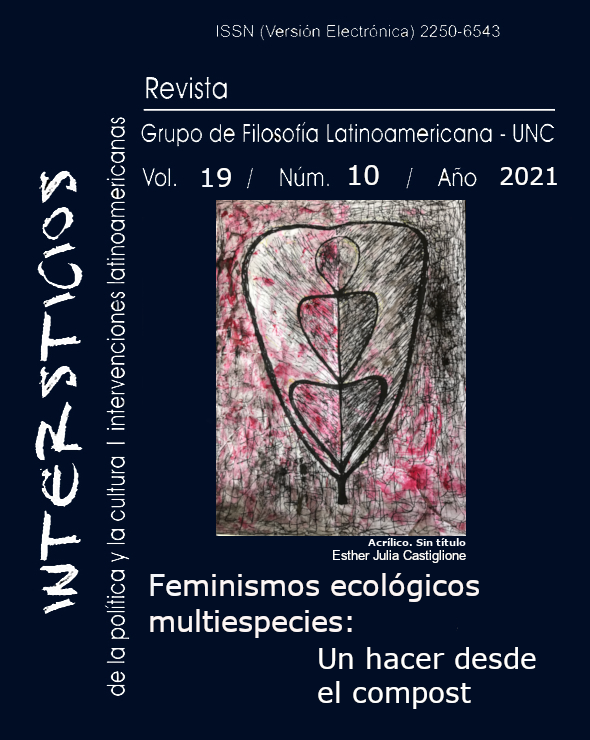Territorial violence against indigenous communities in Cordoba (Argentina)
Keywords:
violencia territorial, comunidades indígenas, cuerpxs-territorios, Mujeres, interseccionalidadAbstract
Along with the struggles of workers, women, peasants, LGBTTIQ+ collectives, Afro groups, the struggle of indigenous peoples throughout the continent has existed and been sustained for centuries. Since the Spanish conquest, the territorial dispossession promoted was based on a systematic plan of physical, material and symbolic erasure/domination of our peoples, marginalized and subalternized first by the colonial and capitalist structure, and then without discontinuity, during the formation of the national and provincial state. At the beginning of this century, practices and representations that reproduce the colonial, heteronormative, patriarchal and capitalist foundational violence still continue in the bodies-territories of indigenous families and communities, expressed in multiple and diverse forms of violence that we call territorial violence. We are particularly interested in making visible and recovering some experiences and reflections on the processes and matrices that sustain this Territorial Violence and that crosses body-territory, we position from our understanding/feeling/knowledge and in dialogue with some of the keys proposed by the decolonial and gender perspectives.Along with the struggles of workers, women, peasants, LGBTTIQ+ collectives, Afro groups, the struggle of indigenous peoples throughout the continent has existed and been sustained for centuries. Since the Spanish conquest, the territorial dispossession promoted was based on a systematic plan of physical, material and symbolic erasure/domination of our peoples, marginalized and subalternized first by the colonial and capitalist structure, and then without discontinuity, during the formation of the national and provincial state. At the beginning of this century, practices and representations that reproduce the colonial, heteronormative, patriarchal and capitalist foundational violence still continue in the bodies-territories of indigenous families and communities, expressed in multiple and diverse forms of violence that we call territorial violence. We are particularly interested in making visible and recovering some experiences and reflections on the processes and matrices that sustain this Territorial Violence and that crosses body-territory, we position from our understanding/feeling/knowledge and in dialogue with some of the keys proposed by the decolonial and gender perspectives.
Downloads
References
Bidaseca, K. (2016) Genealogías críticas de la colonialidad en América Latina, África, Oriente. Buenos Aires: CLACSO/IDAES-UNSAM
Briones, C. (2002) Mestizaje y blanqueamiento como coordenadas de aboriginalidad y nación en Argentina. Artículo en Revista Runa XXIII
------------ (2008) Cartografías argentinas. Políticas indigenistas y formaciones provinciales de alteridad. Editorial Antropofagia. Buenos Aires
Bompadre, J (2015) (Des) memorias de la Docta. De barbudos miscegenados, a comechingones comunalizados: procesos contemporáneos de emergencia étnica en Córdoba. Tesis doctoral, UNC, FfyH, Córdoba.
------------ (2017) Reflexividades etnográficas en relación a los procesos contemporáneos de emergencia indígena en Córdoba, Argentina. Segundo Simposio Sección de Estudios del Cono Sur. Montevideo
Castro-Gómez, S. (2000) Ciencias Sociales, violencia epistémica y el problema de la "invención del otro'' En E. Lander (Comp.) La colonialidad del saber: eurocentrismo y ciencias sociales. Perspectivas latinoamericanas. Buenos Aires, Argentina: CLACSO.
Correa Muñoz, M. y Saldarriaga Grisales, D. (2014) El epistemicidio indígena latinoamericano: algunas reflexiones dese el pensamiento crítico decolonial. En: Revista CES DERECHO. Volumen 5 Nº 2 Juio/diciembre.
Curtoni, R. y Chaparro, M. (2008) El espejo de la naturaleza y la enfermedad histórica en la construcción del conocimiento. Intersecciones en Antropología 9. Facultad de Ciencias Sociales. UNCPBA. Argentina
Elden, S. (2010) Land, terrain, territory en Progress in Human Geography 2010,
Misetich, L y Reyna, P (2018) Lxs deseables y lxs indeseables en Córdoba: una mirada sobre la construcción de lxs otrxs apartir del siglo XIX. Capítulo 9. En: Itinerarios. Recorridos por la historia de Córdoba. Impreso UNC, Córdoba
Gomez, J y Misetich, L (2018) Ciencias Sociales, historia y género, Capítulo 2. En:Itinerarios. Recorridos por la historia de Córdoba. Impreso UNC, Córdoba.
Lander, E. (2000). La colonialidad del saber: eurocentrismo y ciencias sociales. Perspectivas Latinoamericanas. Buenos Aires, Argentina. Consejo Latinoamericano de Ciencias Sociales (CLACSO).
Mignolo, W. (2010) Desobediencia epistémica. Retórica de la modernidad, lógica de la colonialidad y gramática de la descolonialidad. Ediciones del Signo. Buenos Aires.
Quijano, A. (1992) Colonialidad y modernidad/racionalidad. En: Perú Indígena, vol. 13, no. 29, Lima.
---------------- (s.f) “Colonialidad del poder, eurocentrismo y América Latina”.
MINISTERIO DE JUSTICIA Y DERECHOS HUMANOS DE LA NACIÓN (2015) “Derechos de los pueblos indìgenas en la Argentina, una compilaciòn”. Calcagno, S; Canet, LVy Virosta (comp.) L CABA
Reyna, P. (2020) Crónicas en renacer anunciado. Expropiación de tierras, procesos de invisibilización y reorganización comechingón en Córdoba. Editorial Ecoval, Córdoba
Segato, R. (2003) Las estructuras elementales de la violencia. Bernal, Universidad Nacional de Quilmes.
-------------(2006) “Qué es un feminicidio. Notas para un debate emergente. Série Antropología. Brasilia.
------------ (2015) La crítica de la colonialidad en ocho ensayos. Y una antropología por demanda. Ed Prometeo, Buenos Aires.
-------- (2018) Contra-pedagogías de la crueldad. Ed. Prometeo, Bs As.
Sousa Santos, B. (2010) Decolonizar el saber. Reinventar el poder. Trilce, Montevideo.
Viveros Vigoya, M. (2016) La interseccionalidad: una aproximación situada a la dominación. Revista Debate Feminista 52. Universidad Nacional de Colombia. Bogotá.
Downloads
Published
Issue
Section
License

This work is licensed under a Creative Commons Attribution-NonCommercial-ShareAlike 4.0 International License.
Authors who have publications with this journal agree to the following terms:
a. Authors will retain their copyright and grant the journal the right of first publication of their work, which will simultaneously be subject to the Creative Commons Attribution License that allows third parties to share the work as long as its author and first publication in this journal are indicated.
b. Authors may adopt other non-exclusive license agreements for distribution of the published version of the work (e.g., deposit it in an institutional telematic archive or publish it in a monographic volume) as long as the initial publication in this journal is indicated.
c. Authors are allowed and encouraged to disseminate their work through the Internet (e.g., in institutional telematic archives or on their web page) after the publication process, which may produce interesting exchanges and increase citations of the published work (see The effect of open access).


